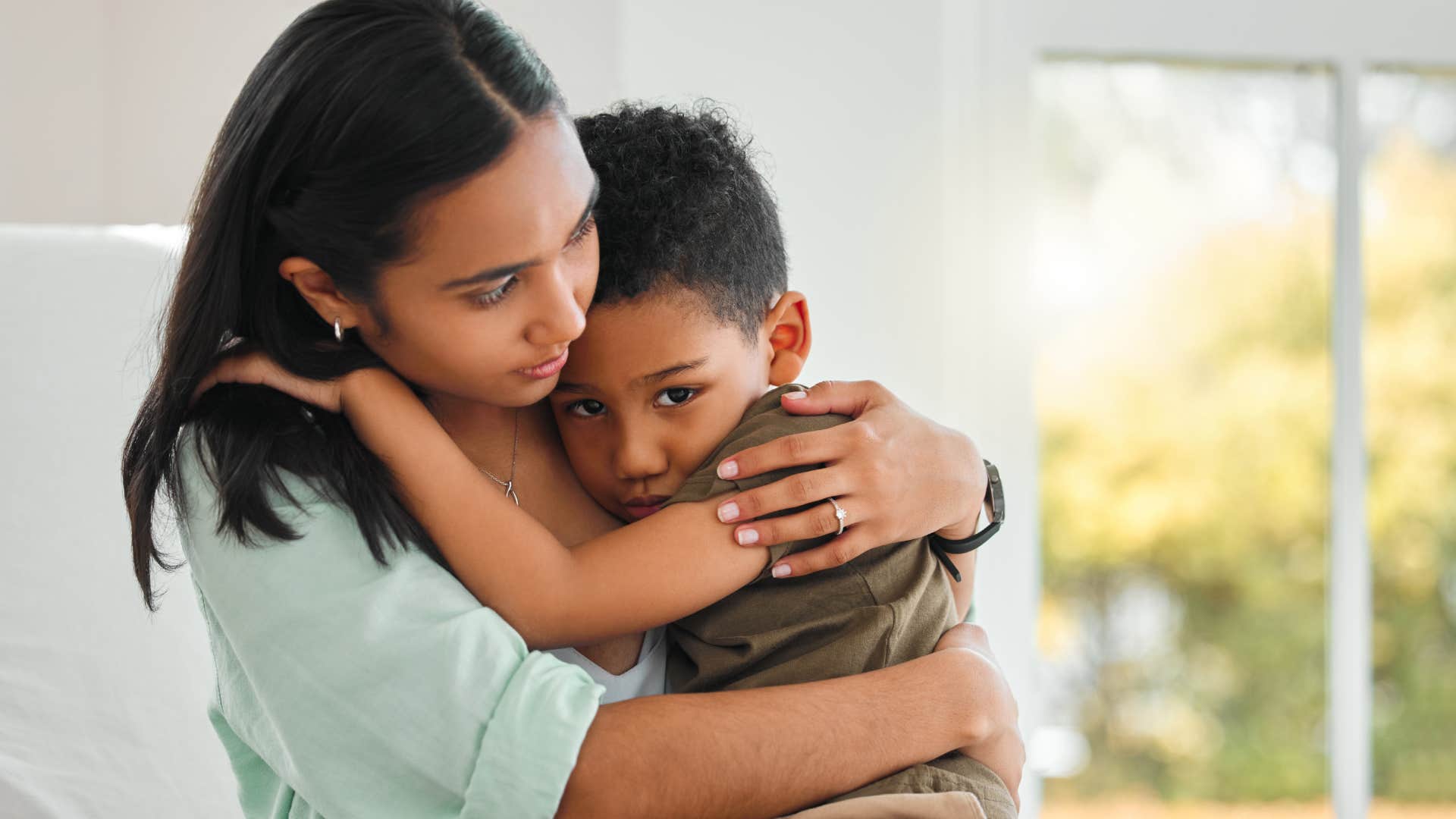11 Complaints Grandparents Have About This Generation Of Kids That Should Deeply Concern Their Parents
Grandparents are seemingly fed up with parents not teaching their children valuable life skills.
 fizkes | Shutterstock
fizkes | Shutterstock Older generations definitely have some preconceived notions about kids in younger generations. Still, when it comes to the complaints grandparents have about this generation of kids, their front-row seat to the problems and shenanigans that seem to be plaguing today's youth tend to feel overwhelming — whether it's excessive use of electronics, a lack of discipline and respect, or zero social skills.
Of course, this generation of kids faces many more challenges than previous generations, including rapid technological advances, mental health struggles, and a future that seems increasingly uncertain. Many of these complaints might just be the result of a changing world in which kids are simply trying to adapt to new pressures and expectations, but that doesn't stop grandparents from wondering why their grandchildrens' parents haven't intervened yet.
Here are 11 complaints grandparents have about this generation of kids that should deeply concern their parents
1. Lack of respect for elders
 PeopleImages.com - Yuri A | Shutterstock
PeopleImages.com - Yuri A | Shutterstock
Many older generations have long complained about the fact that young kids don't seem to respect their elders in the same way that was expected during their time as kids. Whether it's not showing appropriate courtesy or politeness toward older people or disregarding the advice they give to them, this lack of respect has become frustrating for grandparents who feel as if the norm is always giving grace and kindness to elders.
However, psychotherapist Robin Hornstein, PhD said that this expectation to respect elders is not exactly the most "comprehensive or nuanced admonition" we need to give children.
"Blanketing any advice makes very little sense," Dr. Hornstein added. "An older person who is shaming, hurtful, or rude to everyone is hardly a role model, nor someone who has garnered respect."
Instead, children should be taught to respect those who show them respect as well, which means honoring someone's thoughts, feelings, and ways of being.
2. Excessive screen time
 Ground Picture | Shutterstock
Ground Picture | Shutterstock
One of the top complaints that older generations have about young children is the fact that they constantly have their noses buried in their tablets and iPads. Gone are the days when children played outside until the streetlights came on. Instead, children have replaced actual activities with things like watching videos on YouTube and playing iPhone games.
The American Academy of Pediatrics discourages media use by children younger than 2 and recommends limiting older children's screen time to no more than one or two hours a day. According to the Mayo Clinic Health System, excessive use of screen time can impact kids and lead to things like obesity, irregular sleep, behavioral problems, and impaired academic performance.
While it's impossible to keep kids away from screens altogether, there are definitely better ways for parents to occupy their time that don't involve sticking them in front of the television, although there's no reason to shame parents who rely on technology for their kids to get things done. It just shouldn't be a priority or the first option.
3. Having poor manners
 MAYA LAB | Shutterstock
MAYA LAB | Shutterstock
It seems grandparents have started to notice a lack of manners among young children. They either don't use polite pleasantries or courtesies like saying "please" and "thank you," or they've completely abandoned basic etiquette, including not using their phones at the dinner table, being polite in conversation, or even adhering to phone etiquette.
There are a plethora of reasons why kids in this generation don't seem to have the same foundation for manners as older generations did when they were kids. From the fact that social media is as big as it is or they just haven't been taught the right way to move about in this world.
Whatever the case is, grandparents have definitely noticed and aren't too pleased that parents don't seem to notice as well and make a change so their kids can develop into good-natured adults.
4. Lack of work ethic
 Prostock-studio | Shutterstock
Prostock-studio | Shutterstock
One of the major complaints grandparents have about this generation of kids that should deeply concern their parents is that they're "lazy" and "unmotivated" to do certain things — especially those in Gen Z. Grandparents may feel that kids just don't have a sense of urgency to complete a task and will instead procrastinate or simply not do it at all.
Nationally representative surveys like Monitoring the Future asked U.S. 12th graders, most of whom are 18 years old, about their work attitudes since 1976. Up until a few years ago, the work ethic news was positive for Gen Z.
However, it recently shifted. Now, the number of 18-year-olds who said they wanted to do their best in their job, "even if this sometimes means working overtime," suddenly plummeted in 2021 and 2022, and by 2022 it was 36%.
5. Having an entitlement mentality
 Prostock-studio | Shutterstock
Prostock-studio | Shutterstock
A growing concern for many grandparents about kids in this generation is the amount of entitlement and privilege they seem to be exhibiting.
Kids are often criticized for believing that they're owed anything and everything without having put any work or dedication behind something. Grandparents mostly blame this permissive parenting style where kids are given their heart desires without there being clear boundaries or being taught responsibilities.
According to Pepperdine University, some of the ways that parents can remedy an entitled attitude with their kids is by doing things like instilling a sense of responsibility and accountability, encouraging a sense of gratitude, having an open conversation with kids and, most of all, owning up to parenting mistakes that may have caused this issue in the first place.
6. Struggling with face-to-face conversations
 Ground Picture | Shutterstock
Ground Picture | Shutterstock
Since children are growing up in an ever-changing digital world where their entire lives can be lived through social media, it's no surprise that kids are struggling with having conversations with people in person. Their social skills are simply relied on by the convenience of their phones and being able to send a quick text instead of learning to actively listen and participate in actual conversations.
Parenting experts have explained that because children are growing up with technology, it's become an unusual developmental issue. They're learning to communicate "via a screen and a nontraditional lingo developed through shortcuts and texting." It also doesn't help that children are struggling to speak.
According to the CDC, nearly 1 in 12 U.S. children ages 3-17 has had a disorder related to voice, speech, language, or swallowing in the past 12 months.
"When we address speech development early, we're not just helping kids say sounds correctly or learn words — we're giving them tools to understand the language around them and express their needs and wants. These are crucial building blocks in building relationships with family and friends," Melissa White, Managing Director of Clinical Services, said. "Addressing speech and language delays early helps children learn strategies that can positively impact academic performance, confidence in their communication and social skills."
7. Poor financial habits
 Ground Picture | Shutterstock
Ground Picture | Shutterstock
Grandparents often claim that kids would be able to afford more things if they were able to delegate their money in a more responsible way. They criticize their poor spending habits, making impulsive purchases, and not understanding the value of money.
Most of this stems from the fact that the education system doesn't prioritize teaching kids about adult things, like finances, taxes, and how to invest their money. That's why it's important for children to learn about money.
A study from the Journal of Behavioral Decision Making, co-authored by Michigan Ross professor Scott Rick, found that children as young as five already had distinct emotional reactions to spending and saving money and that these translated into actual, real-life spending behaviors.
"If parents wait until their children are teenagers to have serious discussions about money, they've already let a pretty formative decade pass," Rick said.
"Our work suggests that those important conversations need to start earlier than many parents expect. We can't yet provide much guidance on the content of those conversations. But we're currently investigating what elements of parent/child conversations about money influence children's feelings toward spending money."
8. Declining sense of responsibility
 fizkes | Shutterstock
fizkes | Shutterstock
Grandparents have started noticing that kids in this generation have started showing less initiative, whether it's helping out their parents or their younger siblings, a sense of responsibility seems to be lacking in children these days, at least according to them.
They believe that kids lack a sense of independence, and while these complaints come from a place of generational differences, it could also mean that they're just not being taught important life lessons in their homes.
Of course, responsible children don't just happen. It comes from intentional parenting and making sure that children are being given opportunities to make their own decisions, contribute, and also experience the consequences of their actions in cases when they need to be disciplined.
9. A lack of gratitude
 PeopleImages.com - Yuri A | Shutterstock
PeopleImages.com - Yuri A | Shutterstock
Another of the big complaints grandparents have about this generation of kids that should deeply concern their parents is their tendency to not appreciate what they have. With kids being able to have access to anything and everything they want, grandparents may feel that they simply don't have to work or wait to get things they desire.
Some grandparents feel as if parents nowadays are too lenient with their children and allow them to experience certain things without being grateful for them. It doesn't help that social media has curated a culture where kids are constantly exposed to certain material items that others have.
Kids in this generation sometimes lack a sense of awareness of what it means to work hard and sacrifice because it's things like that where people learn the meaning of gratitude, empathy, and responsibility.
10. Disrespect of personal boundaries
 Nicoleta Ionescu | Shutterstock
Nicoleta Ionescu | Shutterstock
Some grandparents may have noticed that because many kids have a sense of entitlement and lack proper etiquette qualities, they've also developed a lack of respect for others' personal boundaries.
They feel entitled to someone's space, time, and energy without realizing that others have a right to privacy.This can mean anything from interrupting conversations, taking things without permission, or constantly demanding attention at the most inappropriate times.
Without learning about the importance of respecting another person's boundaries, kids won't be able to develop important life skills that they'll need as they continue to grow and experience more of the world.
11. Short attention span
 BearFotos | Shutterstock
BearFotos | Shutterstock
Kids in this generation are seemingly struggling with being able to pay attention, and it's especially been noticed by teachers. A poll from Kapow Primary found that more than two in three (70%) teachers questioned said pupils' behavior in class had declined. Children were more likely to move around the room, complain about being bored, and annoy or provoke others in the classroom.
The survey of 504 primary and early years teachers in schools in England also found that 84% agreed that children's attention span was "shorter than ever" post-COVID. Nearly two-thirds (69%) had noticed an increase in inattention and daydreaming.
It doesn't help that kids' attentions are being worsened because of short-form videos and social media. Kids are struggling to focus, and it's bleeding into aspects of their lives, including being able to hold a conversation or even read a book.
Nia Tipton is a staff writer with a bachelor's degree in creative writing and journalism who covers news and lifestyle topics that focus on psychology, relationships, and the human experience.

